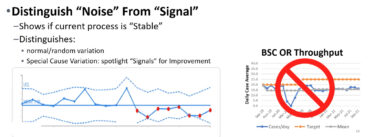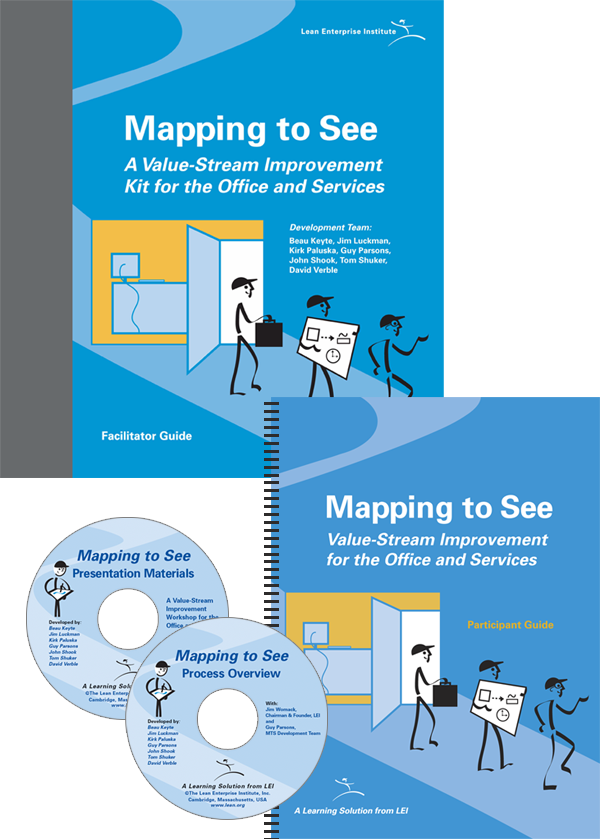Dear Gemba Coach,
I’m in doubt. After two years of struggling with employees leaving and customers coming and going, I’m trying to balance the needs of employees on the team. Financial results do not allow me to have excess people. At this point, I’m thinking about outsourcing some administrative activities to be more flexible, but somehow … it does not feel right from a lean point of view. What does lean say about outsourcing?
We try to outsource volume, not know-how. Obviously, there’s a trade-off in there somewhere. I wouldn’t know how to confirm whether that’s true or not at a company level, but Toyota veterans have told me about Toyota keeping one small subsidiary somewhere to manufacture every part they use, even at a very small percentage of volume. Or Toyota keeping in-house low-volume, difficult parts and using suppliers for high-volume stable parts. Obviously, this might all be urban legends, and Toyota also has very close ties and relationships with suppliers that specialize in components, who will (hopefully) be better at it than the final assembler – hard to tell for sure, but it gives us a direction for thinking about this issue: there is no one set answer.
The real question is: are you looking into outsourcing to be more flexible (handle variation in workload)? Or to reduce costs?
If you intend to reduce costs, you hit a structural problem. Subcontractors, just as anyone else, are looking for a stable workload at a fair price. If you are trying to outsource your own variability and cost, why should the deal be any better for the subcontractor? Either this is a large firm which handles variability because of its volume in what you’re asking them to do – in which case you’ll find it hard to negotiate the price unless you have massive volume to offer. Either it’s a small outfit that might be willing to give on price, but for whom the volume variations will be just as problematic as price.
In lean, winning on farming out work to a subcontractor works well when you find a way to use its specialist knowledge to conduct value analysis/value engineering on the service and split the gains. This, in any case, involves a good relationship and the kind of mutual trust that allows the sharing of goals and method and jointly looking for gains.
If we go back to basics, any team has three types of tasks:
- Value-adding tasks which customers are happy to pay for;
- Support tasks which are necessary to accomplish the value-adding tasks, but that customers expect you to take on your own costs;
- Unnecessary tasks that burden your operations with waste.
Now, obviously, if we could tell at first glance what is what, we would eliminate the wasteful tasks and move on, but real life is not so simple – or easy.
Our Recent Experience
Variation in workload makes it all hard to see. This just happened to us recently at the French Lean Institute – we had scheduled as many events as last year, plus the lean summit, which we only run every two years. Consequently, we had a massive workload bump from the new year to spring.
As you have too much work, you focus on the obvious value-adding work of, in our case, organizing and communicating about the events. Many administrative tasks get shifted to the bottom of the priority list, rightly so because first and foremost we need to succeed at the events. These admin tasks, for the most part, have a reason, so not doing them has consequences – such as chasing participant payments long after the event because we could not cope with on-the-spot payment and so on. This creates extra work that is totally unnecessary but still needs doing, as it cannot be disentangled from the value-adding work.
In the case of our institute, we aim to go fully digital as it comes to admin processes, so the question was topical because we were looking to outsource all our administrative work. But quite evidently, the mess created by our mistakes in planning (and, ironically, compounded by the success of the events) made it hard to outsource “cleanly” as many activities were riddled with in-build muda.
From the gemba, I’ve talked it over with lean sensei Catherine Chabiron who has extensive corporate experience of setting shared service centers and is currently leading our institute’s digital transformation. She sees typical opportunities for outsourcing administrative work:
Outsource Payables: This is very tempting as payables accounting is often headcount intensive. The bet is that we will save on costs if 1) we group headcounts in one single shared service center: 1 + 1 will possibly end up in 1,5. 2) we move out to a low-cost country. Issue: As long as the invoice is received from the supplier and can match the goods receipt and the price of the order, the job is easily outsourced. But 2/3 of the payables activity is dealing with not right first time in the three-way matching of the invoices. And outsourcing will make this NRFT management even more painful as we are further away from those who know and can control why the goods receipt is missing or the price is wrong.
Outsource Payroll: Similarly, payroll is an expert job and it is tempting to outsource it to avoid dealing with an activity that is key but not core. Issue: What makes the job difficult in payroll is that you need to translate all the rules into payroll parameters (overtime, weekend work, bonuses, etc.), which creates a major workload to initiate the process. Beyond that, the difficulty will be to collect monthly all the variable elements such as time management, leaves, sickness, new hires etc. Again, this tricky data collection is made even more difficult if the shared service center is far away from the persons who collect the data. (Usually, as in payables, no budget is set to allow for collaboration and trips on site, so the people in the shared service center can just send emails and hope to receive an answer).
Outsource IT Support: Again, IT support, be it on software or hardware, from helpdesks to software experts, is a tempting outsourcing target as it is once again headcount intensive. And, on paper, one could argue that anyone outside the company can answer questions on Microsoft Office Suite, or SharePoint, deal with PC replacements, and even answer questions and propose help on well-known ERPs such as SAP or Oracle. The idea behind outsourcing helpdesks is also that they suffer from a heavy turnover as no one dreams of spending his or her life answering questions on Excel or Outlook and passing over any tricky questions as soon as it takes more than five minutes to find the answer (Do not overload the frontline of the helpdesks, to ensure all calls will be answered). But helpdesks are also a great source of comfort and satisfaction for users if they are well managed as they solve stupid little irritating problems daily.
Issue: Subcontracted helpdesks are less aware of the little specificities or trickiness of the office tools in a given company as they probably serve many others, so the quality of the solution or answer may be poor, and they may even end-up logging the questions and hand it back to the experts left in the company from which the helpdesk was outsourced. They can also be tempted to play the volume (number of calls answered) rather than the solutions (number of solutions found).
Support questions on ERPs are often related to 1) specific set-up of the ERPs by the company 2) poor data quality 3) poor training of the user. In each case, outsourcing won’t help as 1) you will need to pass on an intimate understanding of the ERP’s customization (and once done, you will be fully and entirely dependent on the subcontractor, which means in the future, higher prices to pay to get to their know-how — see below), and 2) and 3). The solution lies in the company, not with the subcontractor. Like with payables and payroll, you will have outsourced the easy part (match invoices, prepare payroll, replace PCs, answer obvious questions on IT tools), but the messy part will come back to you to deal with (NRFT on invoices, variable elements of payroll, data quality and training issues on software).
Worse, you may end up, as in IT, outsourcing a real know-how on an ERP, and totally depend on a third party, in India or somewhere else in the world, to organize the update and the maintenance and the innovations on a tool that is absolutely key to all to manage interfaces between the different functional silos and with customers and suppliers. And everyone knows that the muda comes from the interfaces. This know-how, once outsourced, is lost forever and the subcontractor will be able to raise her price for the service and know-how over time, far beyond your initial internal costs.
An Excellent Idea, If —
The key to outsourcing successfully lies in understanding such typical problems, and discovering many much more specific to your situation, then creating the contractual and relationship conditions to be able to seek out solutions with the contractor.
Outsourcing can be an excellent idea if the specialist knowledge of the supplier is brought to bear on the problem to reduce overall cost. On the other hand, it’s a poor idea if we’re just passing on the pain to a supplier. Rather than managing the immediate causes of 1/ I have too much work to deal with it and 2/It costs me too much if I do it myself, we need to look at the proper conditions to outsource work:
- There is an activity I know inside out, and where I can see the problems;
- By bringing in a specialist partner we can look for specific gains in the total cost;
- Which means that I will guarantee as much stability of workload as I can.
The root problem in your question is understanding why your activity varies so much. As long as it does vary, it makes sense that sometimes we’re only doing customer work and we’d like to have someone do the rest for us, and at other times, we have time to spare so we don’t need to subcontract.
Subcontracting to handle peaks in workload makes sense if these are completely standardized activities that can be taken up by someone who is both willing and able to follow our standards, be available when we need it, and at a low price. These are three very heavy constraints, and chances are that you will have to choose the order in which you take them. In our own outsourcing approach, first, we’ve chosen a partner we can trust, then stabilized the workload, then looked for a way to reduce the overall cost.
The answer to your question is … it depends. There is no right or wrong answer to outsourcing other than looking at the motivation for outsourcing: do we want to find a partner with whom we can look for muda and leverage their own specialist understanding to seek better ways of working? Or do we look for someone to pass on the pain of not managing our own caseload?







This blog offers practical and insightful tips for outsourcing accounting effectively. It’s a great guide for businesses aiming to streamline finances without compromising accuracy!